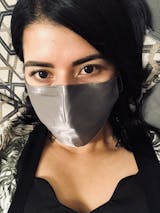It can be confusing when you have Brown or Black skin. What is the best skincare for your Brown or Black skin? How should you look after Brown or Black skin? What are the best ingredients to hydrate, protect, and even out skin tone—for Brown and Black skin?
Because Brown and Black-skinned beauties are largely ignored from mainstream marketing efforts in the skincare and beauty industry, women who are not light or fair-skinned can feel isolated and unsure about their skincare routine needs.
As someone with Brown skin, I want to find products that help me to moisturize, hydrate and nourish my skin without leaving my complexion looking dry and dull—or whitening my skin. This article provides you with the basics on how to create the perfect skincare routine for dark skin, and our top tips for Brown-skinned and Black-skinned beauties.
How Do I Choose Skincare For Brown or Black Skin?
Firstly, it’s important to know the differences of skin depending on ethnicity or race and how this affects your skincare choices. And from there, you can make the appropriate skincare product choices. So let’s dive in…
Top Tips For Glowing Brown Skin And Black Skin
Choose Your Skincare Based On Your Skin TypeWhilst clinical research has found that there are differences in the skin depending on race and ethnicity, there is still a lot of research to do in order to understand the exact differences.
On the whole, even though there are differences in skin depending on your skin’s complexion it is most important to choose your skincare based on your skin type, as opposed to it’s color or complexion — especially in a global skincare and beauty market that mainly centers White skin as an ideal standard.
Clinical research has found that skin structure is essentially the same irrespective of race, but that there’s differences in the size, shape, and interrelationship of different parts of the skin—especially in the epidermis (outer layer of skin)—and this has practical implications on the skincare needs dependant on race (12). This can be observed in the frequency of different skin issues and diseases being reported between different racial skin types (13).
But it's simply easier to focus on catering for your skin type as opposed to race, because—quite frankly—the global mainstream skincare and beauty market will not currently meet your needs effectively based on race.
The hormone melanin, and its level of presence, affects the skin’s properties. Melanin is the hormone that makes the skin dark. The more melanin present, the darker the skin. Very pale and fair skin (White skin) produces almost zero melanin. Whereas Asian skin, Hispanic skin, and Black skin have higher levels of melanin present.
Academic research by the American Journal Of Clinical Dermatology found that there are distinct physiological differences in the skin due to the concentration of melanin present (1). And the needs of the skin does change depending on how much melanin is present.
The main consensus in academic research is that transepidermal water loss (TEWL) is higher in Black skin compared to White skin (1, 2). Transepidermal water loss (TEWL) is when moisture escapes from the skin and evaporates. This can lead to dry, dull, irritated, and unhealthy skin as moisture plays a key role in the skin’s vital restoration and rejuvenation processes (including natural exfoliation). So the higher the level of melanin, the more important it is to moisturize—yes, even if your skin is prone to being oily.
Exfoliation is also an important process for the skin. Dead skin cells are sloughed away which helps to prevent clogged pores, and it also allows nutrients and moisture to reach the cells that need it most. Exfoliation helps to improve the skin’s texture and smooths the skin, in turn making it look like it is glowing and healthy.
But the skin also naturally exfoliates in a process called desquamation. Desquamation is the skin’s natural cell renewal process which includes skin cell creation, sloughing, and replacement. Desquamation (natural exfoliation) happens every 2-4 weeks. So roughly every month you have a whole new refreshed outer layer of skin.
Exfoliation and chemical peels help this process and hold other important functions. But contrary to what the skincare industry would have you think—you aren’t necessarily going to drown in dead skin cells and be riddled with acne without them. The body is very capable and self-sustainable at cell renewal without any intervention.
Although more research needs to be performed on desquamation and skin complexion, a clinical study found that Black skin has a significantly higher spontaneous natural exfoliation rate (1). This is believed to be the reason for the common dry skin and xerosis (abnormally dry skin) skin conditions seen clinically in Black skin.
So Black skin has an inclination towards dryness and higher self-exfoliation. This means that those with Black skin need to focus on thorough hydration and moisturization. Combined with ensuring exfoliation is not overused, which could lead to inflamed and irritated skin.
Sustainable Beauty Editors Choice: M.S Skincare | Illume | Radiance Enhancing Moisturizer
Why? Rich in antioxidants, like coconut oil, red seaweed, and vitamin E. With deeply nourishing and hydrating botanical ingredients like rose flower water, organic jojoba seed oil, and aloe vera that perfectly refresh darker skin and balance skin tone.
Understand Sebum And Oil—And Stop Stripping The Skin Of Oil
It can feel counterintuitive for those with more melanin (Asian, Hispanic, and Black skin) to moisturize more. Because Black skin also secretes more sebum and is more oily than white skin (3,10). We have been taught by the skincare industry to prevent the skin from creating more oil. And that if there is more oil on the skin, then it needs to be stripped, hidden, and mattified. But when the skin creates more oil, it can actually add to the skin’s protection of the epidermis.
The clinical research shows that Black skin creates more sebaceous lipids (fatty oils) but also that it’s prone to higher water loss (10). So the higher level of oil on the skin is actually there to help protect and hydrate the skin. And stripping the skin’s oil would not be helpful for this particular skin type. Adding oil to oily skin can sometimes be really beneficial to help balance the skin. Whereas stripping oil makes the skin produce more oil—especially because the skin was naturally producing oil for protective hydration purposes (15).
Sustainable Beauty Editors Choice: Honua Skincare | ʻŌlena Beauty Oil
Why? Rich in turmeric, a powerful scavenging antioxidant. A nice alternative to moisturizing cream, or use on top of your moisturizer as an added protective layer. Filled with plant-based oils kukui nut seed, kamani seed, jojoba seed, and macadamia seed to protect, hydrate, and illuminate dark skin, whilst improving skin tone.
Balance The Skin’s pH
The pH of Black skin is suggested to be lower than White skin (1). The skin’s natural pH is slightly acidic (about 5.5 on the pH scale). And the acidity of the skin is largely responsible for keeping the skin healthy. The skin’s acid mantle protects the skin from pathogens, allergens, pollution, and bad bacteria by helping healthy bacteria flora stay attached to the epidermis. A clinical study on dermopharmacy has implied that changes in the skin’s pH level could hold a role in skin diseases and irritation (4).
pH balancing skin care is important to ensure the integrity of the skin is kept strong, but it is especially important if you have dark or Black skin. When the skin is at its optimal pH level of slightly acidic, the protective barrier function and hydration retention of the skin improves. Opt for pH balanced face cleanser, shampoo, hair conditioner, body wash, and facial moisturiser for the best overall results.
Aid And Enhance Healthy Wound Healing
Black skin has larger mast cell granules than White skin. Mast cell granules are responsible for aiding your skin’s immune response (1,5). Mast cells play key roles during different stages of the skin wound healing process (6). And larger mast cells are key contributors to keloid hypertrophic scars (enlarged raised scars)—which are far more common for those with dark or Black skin, than White skin.
Ensuring that the ingredients you use within products support healthy wound healing is important as the skin encounters damage all the time, and dark skin is more prone to scarring. To prevent long term damage, scars, or hypertrophic scars make sure that your skin care protects and repairs from daily skin damage.
Sustainable Beauty Editors Choice: Earth Harbor | Aurora | Superfood Luminance Ampoule
Why? Packed with vibrant superfoods and antioxidants—like avocado fruit oil, organic seaweed extract, organic neem seed oil, and hemp seed oil—that support the skin’s natural healing ability, help to brighten complexion, and balance skin tone.
Protect The Skin From The Sun Using SPFProtecting the skin from sun damage is a universal skin care tip. But it is especially important for those with dark or Black skin to prevent hyperpigmentation. The UVA and UVB rays released from the sun can cause a variety of skin and health issues such as; cancer, hyperpigmentation, premature aging, fine lines, wrinkles, and poor skin texture (7).
If you have dark or Black skin, you might find that you tend to burn less easily, so it can become a struggle to remember to wear sunscreen. Because burning from the sun’s rays can be a great reminder of how important it is to protect the skin and wear sunscreen.
Interestingly, melanin actually protects the skin to some degree from the sun’s ultraviolet radiation (UVR). The current clinical data shows that people with White skin are 70 times more likely to get skin cancer than people with Black skin (8). It has been suggested that melanin has a sun protection factor (SPF) of up to SPF 4 (8).
But UVR damage is still known to play a key role in the aging of skin, and it is important for all people to wear sunscreen (9). The lack of melanin present in White skin—along with its natural UVR protection—plays a contributing role to why White skin doesn’t age as well as Black or darker skin tones. In general, White skin wrinkles and sags quicker than skin of color (10,14).
And for people of color with dark or Black skin, the sun causes a higher risk of hyperpigmentation. Asian skin is prone to hyperpigmentation, but it can be prevented through adequate sun protection, and antioxidants (11). So as a general rule, we all need to dose up on SPF and antioxidants to prevent the unwanted side effects of sun damage.
Dermatologists have found that using a broad spectrum SPF 30 daily for a year significantly improves skin complexion, skin texture, and hyperpigmentation. They concluded that the use of a broad spectrum SPF 30 daily can quite possibly reverse visible sun damage, and also prevents further sun damage (16).
Sustainable Beauty Editors Choice: Honua Skincare | Malu Day Cream SPF 30
Why? An amazing broad spectrum SPF filled with antioxidant botanical goodies that are gentle and nourishing for dry skin, whilst also being highly protective and hydrating. Enjoy the potent effects of a sustainable SPF combined with aloe vera, oat bran extract, vitamin C, and jasmine oil. Essential for brown and Black skin to ensure a balanced skin tone and vibrant complexion. Suitable for sensitive skin.
Detox And Protect The Skin By Using Antioxidants
Antioxidants are naturally found in many plants, fruits, and vegetables and they’re another vital aspect of sun protection and free radical damage control. Antioxidants contain free radical scavengers. They basically hunt for unstable free radical molecules and then stabilize them which stops free radicals from doing damage to the skin and body (18).
An influx of free radicals through UVR and sun damage can lead to oxidative stress. Oxidative stress is where the body cannot protect itself against the increasing and unbalanced ratio of unstable molecules. This can lead to a variety of unwanted and dangerous health issues such as cancers, premature aging, inflammations, DNA damage, and more (17,19).
Luckily, we can protect ourselves through adding antioxidants to our skincare routines. A clinical study performed by dermatologists found that antioxidants and sunscreens compliment each other and provide a superior form of UVR protection than sunscreen alone (17).
The Journal Of Cosmetic Dermatology notes that obtaining antioxidants through skincare application is extremely beneficial as the skin is able to receive a far higher concentration of the antioxidant than it could through diet and consumption of vitamins (20). For example, with vitamin C—which is a well known powerful antioxidant—the skin can receive 20-40 times higher the amount of antioxidant than it could through an orally consumed vitamin C.
Antioxidants are best used in both daytime and nighttime skincare routines for the most powerful results.
Sustainable Beauty Editors Choice: Earth Harbor | Nebula Adaptogen Clarity Ampoule
Why? Highly moisturizing due to the benefits of squalene, combined with the antioxidant and anti-inflammatory properties of sea lavender, ginseng, and vitamin E. A great antioxidant serum for dry skin and darker skin tones. Incorporate into your nightly skin care routine to help balance an uneven skin tone.
Look After The Skin’s Protective Barrier Through Effective Hydration
The skin’s protective barrier is so important for healthy glowing brown skin and black skin. When the skin’s barrier is damaged this can affect transepidermal water loss (TEWL). TEWL is a normal function that allows water to evaporate from the skin.
But when the skin loses too much water this can be detrimental to the skin and healthy skin cell function. The skin relies on hydration to function properly — this includes within its own restoration, healing, and rejuvenation cycles such as desquamation (natural exfoliation).
We always talk about hydration, hydration, hydration because it really does play a central role in radiant and glowing skin. Clinical research has found that Black skin has a higher electrical resistance than White skin which also suggests that the Black epidermis is less hydrated than the White epidermis (12). This corroborates the other findings on Black skin and darker skin tones needing extra moisturization to look its best.
But it’s not as simple as just moisturizing the skin—the timing of moisturization is vital for the best results. Timing is important to ensure that you seal moisture into the skin, as opposed to sealing it out which actually causes further dehydration.
Dermatologists advise that the best time to apply moisturizer is after moistening the skin, either through a shower, sponge bath, or by using a quality facial toner 21). This allows the moisture to be locked in by the oil or cream which seals the skin, as opposed to sealing out moisture.
Dermatologists also note that only 50% of applied moisturizer is present on the skin after eight hours post application. Because the applied cream or oil either stays on the surface of the skin, gets sloughed away, rubs off onto other materials, gets absorbed into the body, or evaporates from the body altogether. So they recommend application up to 2 to 3 times a day depending on the skin’s dehydration levels.
Because Black skin is known to have higher levels of water loss—which can commonly be seen in ‘ashy’ skin—it is extremely important to moisturise at the right time, the right amount, and with the right products (1,2,10).
Pro Sustainable Skincare Tip: Avoid products containing a high amount of alcohol as they tend to strip your skin of moisture. If alcohol is the first ingredient on the ingredients list, then alcohol is the main ingredient in the product.
Sustainable Beauty Editors Choice: Honua Skincare | Māhealani Moonlit Glow Balm
Why? Deep hydration accompanied by a healthy dewy glisten. Enjoy the radiance that comes with the Moonlit Glow Balm. Shea butter, illipe seed butter, squalene, and cocoa seed butter make this the perfect moisturizer for darker skin tones.
Remove Makeup Properly
Black skin is prone to having a larger pore size, which also correlates to higher sebum production. Higher sebum production, and enlarged pores can possibly increase the risk of clogged pores, pimples, and acne if makeup and dirty debris aren’t removed properly from the skin(10,22). Make sure you invest in a proper skincare routine that deeply cleanses, tones and moisturises the skin effectively.
You can either use a gentle cleanser to remove makeup and debris from the skin, or the oil cleansing technique. The oil cleansing technique is highly effective for both oily skin and sensitive skin.
Sustainable Beauty Editors Choice: M.S Skincare | Mantra | Skin Perfecting Cleanser
Why? A gentle but effective face wash that is perfect for melanin-rich skin. Nourish, protect and thoroughly cleanse with aloe vera, red seaweed extract, turmeric extract, and neem extract. Compliment your skincare ritual with natural Ayurvedic antioxidants. Suitable for normal skin, dry skin, and combination skin.
Asian Skin Is Generally More Sensitive
Asian skin is generally more sensitive, especially to chemicals, medicated drugs, or anything that is put onto it (10). Acne, dermatitis and viral infections are clinically reported to be the most common skin issues in Asian skin (11). This could be due to the fact that Asian skin has a thinner stratum corneum.
The stratum-corneum is the outer layer of the skin (epidermis), and is responsible for protecting the body from the environment. Asian skin also has a higher eccrine gland density than other skin types. The eccrine glands help the skin and body to maintain homeostasis through sweating and body temperature.
So if you are Asian it is extremely important to make sure that your skincare is non-toxic and doesn’t irritate or inflame the skin (11).
Conclusion
It’s not always easy to find the right sustainable skincare, and sometimes it can take patience and testing different eco-friendly beauty products to see what works best for darker skin tones. These tips are a great start to understand how your needs can differ from White skin, and will help you to choose the right sustainable skincare products for your dark skin care routine. Healthy skin effortlessly glows. And by using the tips in this article, you’ll be able to keep your skin looking refreshed, radiant and clear.
Carmen Lee is a certified yoga teacher, childbirth doula, and wellness coach. She educates on womb wellness, sacred wisdom, and ancestral-connected living. You’ll find her passionately advocating radical self-care and transformational self-empowerment through sustainable beauty and self-love rituals.
Some of the products promoted in our blog are from our online store. Many others are brands we have researched and found to be great examples of sustainable, ethical, and innovative brands in their field, and we don't make any profit from mentioning them in our blog. #CollaborationOverCompetition
References:
- https://pubmed.ncbi.nlm.nih.gov/14640777/
- https://pubmed.ncbi.nlm.nih.gov/3207618/
- https://www.ncbi.nlm.nih.gov/pmc/articles/PMC3772921/
- https://pubmed.ncbi.nlm.nih.gov/16864974/
- https://www.ncbi.nlm.nih.gov/pmc/articles/PMC3985512/
- https://pubmed.ncbi.nlm.nih.gov/11844219/
- https://pubmed.ncbi.nlm.nih.gov/8507288/
- https://www.ncbi.nlm.nih.gov/pmc/articles/PMC2671032/
- https://www.ncbi.nlm.nih.gov/pmc/articles/PMC4292080/
- https://pubmed.ncbi.nlm.nih.gov/18492142/
- https://pubmed.ncbi.nlm.nih.gov/30039861/
- https://pubmed.ncbi.nlm.nih.gov/1485761/
- https://pubmed.ncbi.nlm.nih.gov/92483
- https://www.ncbi.nlm.nih.gov/pmc/articles/PMC4756870/
- https://www.ncbi.nlm.nih.gov/pmc/articles/PMC2835893/
- https://pubmed.ncbi.nlm.nih.gov/27749441/
- https://pubmed.ncbi.nlm.nih.gov/20429687/
- https://www.ncbi.nlm.nih.gov/pmc/articles/PMC3789494/
- https://pubmed.ncbi.nlm.nih.gov/18839043
- https://pubmed.ncbi.nlm.nih.gov/17134430/
- https://www.ncbi.nlm.nih.gov/pmc/articles/PMC5849435/
- https://www.ncbi.nlm.nih.gov/pmc/articles/PMC5605215/










